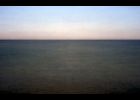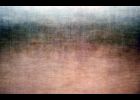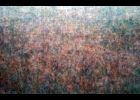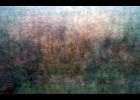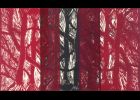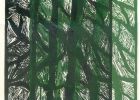Flusser Studies 16 - November 2013 / Special Issue: Guest editor „Internationaler, interdisziplinärer Arbeitskreis für philosophische Reflexion“
Der ‘hierarchiefreie’ Raum
The computer computes. Landscapes, disaster, nature, culture, icons, explosions. Daily news. Images of events that happen far away. Pixels and quanta, one or zero. In this multilayered-series I let the computer merge hundreds of single images into each other. They are taken systematically as well as randomly from the internet (or my private collection). The titles refer to the words which were entered into the image search engines. At recurring points of the calculation process I intervene with aesthetic decisions.
Das handlungsfähige Projekt? oder: Die Frage nach der Subjekthaftigkeit des Projekts in der Menschwerdung. Zwischen Geste, Projektion und Verantwortung
In the thinking of Vilém Flusser, the question of subjectivity is linked to the question of being human (Mensch-Sein) or becoming human (Mensch-Werden). The human subject should be considered as dependent on media’s cultural and anthropological conditions. In this context, changes in media conditions lead to changes of the human subject. Flusser calls this process a media-cultureanthropological evolution. According to this thesis, the human being is no longer defined as a subject in relation to an object but rather as a “project in a (second) incarnation” (Menschwerdung). The human subject is progressively freed from its dependency on an objective world. Therefore, the dichotomy of subject and object disappears and our existential condition of being in the world (In-der-Welt-Sein) change. We give up the idea of a given and still standing world in favor of an inter-subjective construction, in which the “I”, “You,” and “It” turn out to be projections. The question is: are we still able to talk about the ability to act (Handlungsfähigkeit) in the context of a post-historical project? Isn’t acting a genuine gesture/expression of the understanding of the “subject of objects,” and of agency in the “objective world”?
Wir müssen die Frage nach der Freiheit neu formulieren. Von der unwürdigen Entscheidungsfreiheit zur Freiheit als Projektion – eine Spurensuche bei Vilém Flusser
Most theories about freedom depend on the idea of freedom of choice. If you can make your decisions without pressure from the within or without, then you are free. Here freedom of choice is the condition for the freedom of will and action. However for Flusser, freedom of choice is undignified for the human being. With this statement as my starting point, I examine Flusser’s concept of freedom. I will first summarize Flusser’s history of the development of world views and human consciousness, and then reconstruct the different concepts of freedom within them. Then I will analyze Flusser’s opinion about the notion of freedom within a quantitative world view. Freedom has in this context different definitions: intention, game with chance, projection, creative involvement, or responsibility. This essay performs a critical exploration of the relationship of these definitions to each other and the clarification of Flusser’s specific characterization of freedom.
Vilém Flussers Technik Begriff
According to Vilém Flusser, it is not enough to define technics as merely technology – the scientific subjection of the world by human beings. Technics is a human attitude towards the world and is thus inseparably connected to the process of human thinking and therefore to the human existence in general. This text wants to provide insight into Flusser’s extended concept of technics and how it can offer an alternative perspective on the relation between human beings and technics.
multilayered
The computer computes. Landscapes, disaster, nature, culture, icons, explosions. Daily news. Images of events that happen far away. Pixels and quanta, one or zero. In this multilayered-series I let the computer merge hundreds of single images into each other. They are taken systematically as well as randomly from the internet (or my private collection). The titles refer to the words which were entered into the image search engines. At recurring points of the calculation process I intervene with aesthetic decisions.
Die Freiheit des Fremden. Reflexionen zur Halt- und Bodenlosigkeit. Eine Skizze
Flusser’s philosophical autobiography, Bodenlos, reflects upon the existential meanings of being groundless–that is, to have lost everything, materially, spiritually, and conceptually. Bodenlos contrasts with the more theoretical concept of Haltlosigkeit–the human condition of uncertainty–, in which the foreign and the concrete are constitutive of all “groundless” existence. In spite of the more theoretical claim of Haltlosigkeit, the term bodenlos refers to the ambiguity of all situations of a human existence in crisis. Rather than the Heideggarian “heroic” act of deciding and of an autonomous selfdetermination, this Bodenlosigkeit is, moreover, a feeling of lost ground, of being displaced that builds up the concrete, actual, and new situation. This also informs Flusser’s understanding of freedom and liberty, an understanding which is not simply based on autonomous free will and self-awareness or on certain reactive behaviour. Rather, it is – as bodenlos – the in-between both of these existential possibilities and theoretical positions. This is what the independence of the migrant, the liberty of the traveller, the freedom of the foreign itself could mean: the highly precarious movement of the inbetween.
Sagrado e profano na escrita. Vilém Flusser e Christoph Türcke
The article compares two readings of the dialectic of the sacred and the profane in relation to the concept of writing. Flusser believed that there is no future for writing because it becomes an obsolete code, increasingly overcome by programming. Türcke, on the other hand, observed that the paradigm shift introduced by new media did not change in any way the basic structures of capitalism, on the contrary, it reinforced and renewed them. While Flusser stated that writing is profane, linear, and therefore tied to the conditions of causality, historicity, authorship and scientific progress, Türcke examined a historical development of writing, which explored the specific functions of the profane and the sacred.
Vernetzung der Welt
My first connection with Flusser was in the place of his birth – Prague. Later in Prague and Zurich I read in magazines many articles by him. The text “Towards a Philosophy of Photography” was very important for me. Vilém Flusser finds in photography a possibility to realize a space of freedom. In that sense, Photography is a starting point for every philosophy. In the text “Kommunikologie weiter denken” Flusser stated: “The space is not only twisted. The space comes to me and I come to him [it]. Time is twisted too. Past becomes future and future becomes past and both are contemporary.” This is the point of view of the graphic Vernetzung der Welt.
Flussers Kanäle
In his studies on the subject of human communication Flusser repeatedly refers to the concept of canals and channels. He classifies basic structures of various situations of communication by means of disclosing interconnections and arrays of canals. This paper takes a closer look at the concept of canals in Flusser’s work and aims to systematize his different and sometimes inconsistent approaches. Further it discusses the significance of this topic for Flusser’s late work.
Das Strahlen in der Black Box. – Sprechen und Hören in der Medienphilosophie Vilém Flussers
This essay explores the rather rare studies on the subjects of speaking and hearing in the works of Vilém Flusser. It begins by identifying the historical and systematical modes of speaking and hearing in Flusser’s media philosophy. The phenomenology of the body (Leib) plays a central role in the discussion of these particular modes of communication. Significant for Flusser’s interpretation of these modes is the relation they have to a notion of political space. In this regard the essay asks: what is the impact of “the end of politics” on speaking and hearing?

